الأسواق
عند تصميم تدخل إنساني وتحديد ما إذا كان سيتم استخدام المساعدات النقدية والقسائم، يجب أن يكون تحليل السوق جزءًا من تحليل الاستجابة الشامل. وثبت أن دعم الأسواق للعمل بشكل جيد يؤدي إلى تعافي أسرع وزيادة المرونة في المناطق المتضررة من الكوارث.
واستثمرت العديد من المنظمات في تطوير أدوات لدعم تحليل السوق وتفكر في البرمجة القائمة على السوق بشكل أكثر شمولية. يشمل ذلك التدخلات التي تستخدم السوق (مثل التحويلات النقدية إلى السكان المتضررين)، بالإضافة إلى التدخلات التي تدعم الأسواق بشكل مباشر (مثل المنح المشروطة للمتداولين لإعادة تشغيل أسواقهم).
Related initiatives
Featured content

Introduction to Market Analysis
دورة تدريبية
This 30 minute online course provides an introduction to the analysis of markets in emergency contexts, with input from some of the world’s leading thinkers on the topic.

A Practical Guide to Market Analysis in Humanitarian response
دورة تدريبية
A three to four hour online course designed to provide future humanitarian market assessment team members with a solid understanding of theory and steps of market assessments so that they can join assessment teams prepared with a basic understanding of what they will be doing and why.
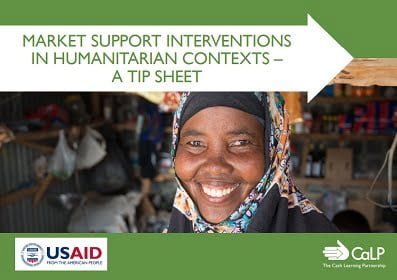
Market Support Interventions in Humanitarian Contexts – a Tip Sheet
Guidelines and Tools
This tip sheet defines what market support programming in humanitarian contexts is, and what it can look like in practice. It enables humanitarian practitioners to systematically consider market support interventions alongside other programme activities. The scope includes support interventions focusing on supply/availability and on demand/access. The tip sheet is based on secondary data...
Latest
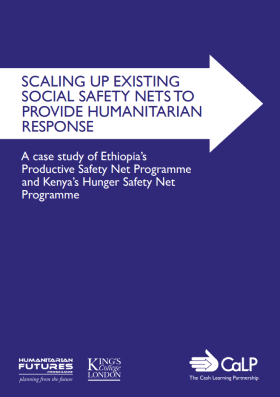
Scaling Up Existing Social Safety Nets to Provide Humanitarian Response: A case study of Ethiopia’s Productive Safety Net Programme and Kenya’s Hunger Safety Net Programme
Policy paper
A case study of Ethiopia’s Productive Safety Net Programme and Kenya’s Hunger Safety Net Programme. This thematic report has been undertaken as part of a 2013 research study entitled, Is Cash Transfer Programming ‘Fit for the Future’? The research was commissioned by the the CALP Network and...
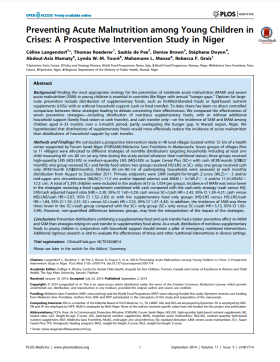
Preventing Acute Malnutrition Among Young Children in Crises: A prospective intervention study in Niger
Report
Governments and donor agencies need to know which preventative strategy is most effective, particularly among children under 2 years old who are most vulnerable to acute malnutrition. Here, the researchers compare the effectiveness of seven preventative strategies—including the distribution of...
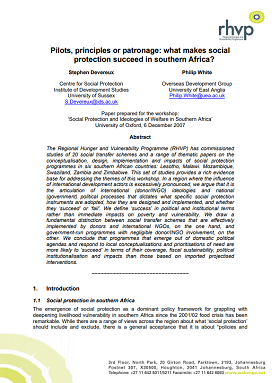
Pilots, principles or patronage: what makes social protection succeed in southern Africa?
Report
The Regional Hunger and Vulnerability Programme (RHVP) has commissioned studies of 20 social transfer schemes and a range of thematic papers on the conceptualisation, design, implementation and impacts of social protection programmes in six southern African countries: Lesotho, Malawi....
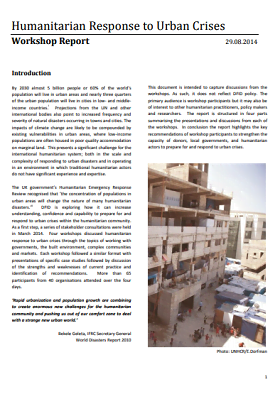
Humanitarian Response to Urban Crises: Workshop Report
Report
The UK government’s Humanitarian Emergency Response Review recognised that ‘the concentration of populations in urban areas will change the nature of many humanitarian disasters.’ii DFID is exploring how it can increase understanding, confidence and capability to prepare for and respond to urban...

A Double-edged Sword: Livelihoods in emergencies guidance and tools for improved programming
Guidelines and Tools
This document aims to help economic development practitioners who design economic strengthening projects with the particular aim of improving child wellbeing and for others whose aim is poverty alleviation more broadly. The guidance presented is based on the understanding that: 1. Household economic...
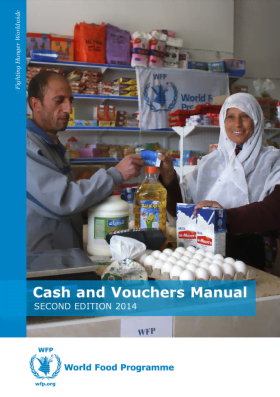
Cash and Vouchers Manual – Second edition
Guidelines and Tools
This second edition of the Cash and Vouchers Manual captures the latest corporately endorsed business processes and procedures, providing the most up-to-date tools (i.e. analytical, assessment, monitoring) that have been developed through close intra-departmental collaboration between Headquarters...

Insufficient Evidence? The Quality and Use of Evidence in Humanitarian Action
Report
This paper (and the ALNAP meeting on which it is based) is underpinned by the sense that ‘at present, humanitarian decisions are often based on poor information’ (DFID, 2012: 5) and are ‘anecdote, rather than evidence, driven’ (Mazurana et al., 2011: 1). Even when evidence is available, decisions...
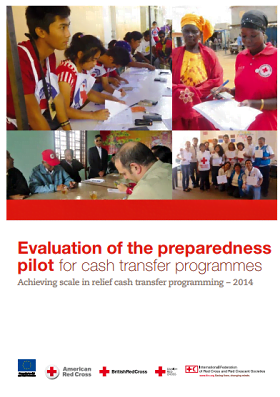
Evaluation of the Preparedness Pilot for Cash Transfer Programmes – Achieving scale in relief cash transfer programming – 2014
Report
It is recognized that cash transfer programming can be effective in supporting populations affected by disasters in a way that maintains dignity and choice for beneficiaries while stimulating local livelihoods, economies and markets. However, the majority of cash transfer programming has been undertaken...
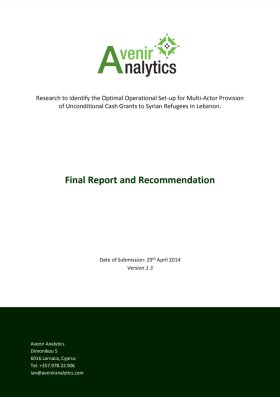
Research to Identify the Optimal Operational Set-up for Multi-Actor Provision of Unconditional Cash Grants to Syrian Refugees in Lebanon: Final report and recommendation
Report
This report contains the findings and recommendations from a 30 day research project commissioned by the cash working group (CWG) based in Lebanon, and more specifically the team tasked with the operational set-up. The Avenir research project team was engaged to identify the optimal operational set-up for...
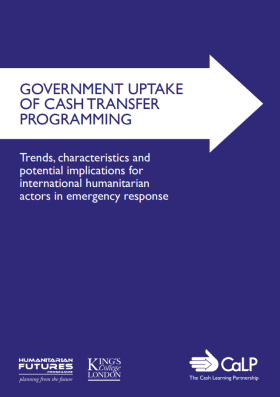
Government Uptake of Cash Transfer Programming: Trends, characteristics and potential implications for international humanitarian actors in emergency response
Policy paper
Trends, characteristics and potential implications for international humanitarian actors in emergency response. This thematic report has been undertaken as part of a 2013 research study entitled, Is Cash Transfer Programming ‘Fit for the Future’? The research was commissioned by the the CALP...
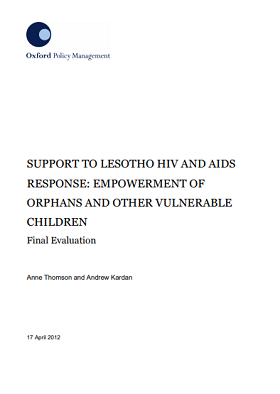
Support to Lesotho HIV and AIDs Response: Empowerment of Orphans and Other Vulnerable Children
Report
Oxford Policy Management (OPM) has been contracted by UNICEF Lesotho to undertake the final evaluation of the Project “Support to Lesotho HIV and AIDS Response: Empowerment of Orphans and Vulnerable Children”. The main objective of this evaluation is to provide decision makers in the Government of...

Scoping study – Emergency cash transfer programming in the WaSH and shelter sectors
Report
Over the past few years, the dialogue on cash transfer programming has progressed beyond initial debates about whether distributing cash and vouchers is a valid response modality at all to a general acceptance of their added value in appropriate contexts. Beyond the livelihoods and food...
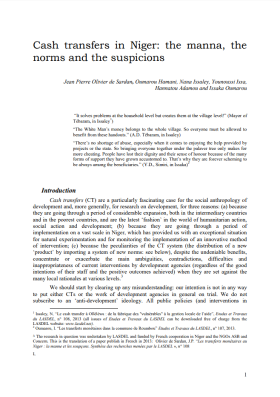
Cash transfers in Niger: The manna, the norms and the suspicions
Report
Cash transfers (CT) are a particularly fascinating case for the social anthropology of development and, more generally, for research on development, for three reasons: (a) because they are going through a period of considerable expansion, both in the intermediary countries and in the poorest countries,...
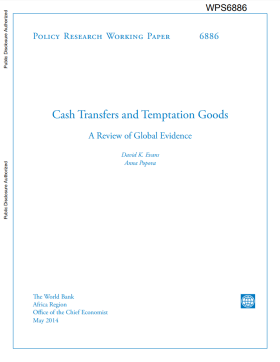
Cash Transfers and Temptation Goods: A review of global evidence
Report
Cash transfers have been demonstrated to improve education and health outcomes and alleviate poverty in various contexts. However, policy makers and others often express concern that poor households will use transfers to buy alcohol, tobacco, or other “temptation goods”. This paper reviews 19...
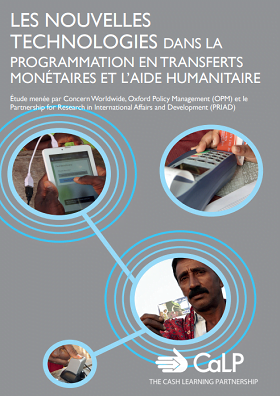
Les nouvelles technologies dans la programmation en transferts monétaires et l’aide humanitaire
Report
Le CALP Network a chargé Concern Worldwide de diriger un consortium également constitué d’Oxford Policy Management (OPM) et de Partnership for Research in International Affairs and Development (PRIAD) afin d’analyser l’utilisation actuelle des nouvelles technologies appliquées aux programmes...
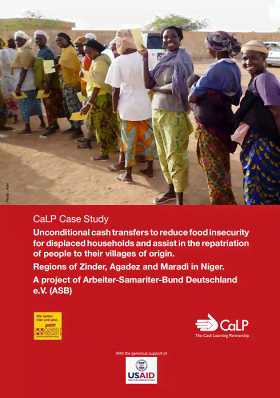
The CALP Network case study – Unconditional cash transfers to reduce food insecurity for displaced households and assist in the repatriation of people to their villages of origin – Niger
Report
In 2012, Niger was affected by a food crisis that caused large population displacements. The NGO Arbeiter- Samariter-Bund Deutschland e.V. (ASB) distributed unconditional cash transfers in areas of food insecurity to improve food access for those displaced and those affected, and to help repatriate...
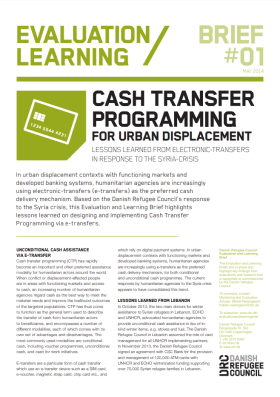
Cash Transfer Programming for Urban Displacement
Policy paper
In urban displacement contexts with functioning markets and developed banking systems, humanitarian agencies are increasingly using electronic-transfers (e-transfers) as the preferred cash delivery mechanism. Based on the Danish Refugee Council’s response to the Syria crisis, this Evaluation and...
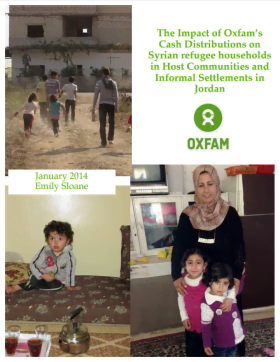
The Impact of Oxfam’s Cash Distributions on Syrian Refugee Households in Host Communities and Informal Settlements in Jordan
Report
Given the absence of viable alternatives to cash transfer programmes (CTPs) in Jordan, such programmes will certainly continue for the foreseeable future. It is crucial to review their impact to date in order to identify common issues and lessons learned and adjust programmes accordingly. The present...
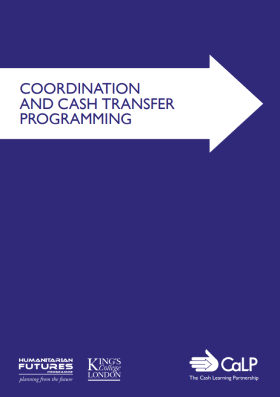
Coordination and Cash Transfer Programming
Policy paper
This thematic report has been undertaken as part of a 2013 research study entitled, Is Cash Transfer Programming ‘Fit for the Future’? The research was commissioned by the the CALP Network and undertaken by the Humanitarian Futures Programme (HFP), King’s College London. The overall...
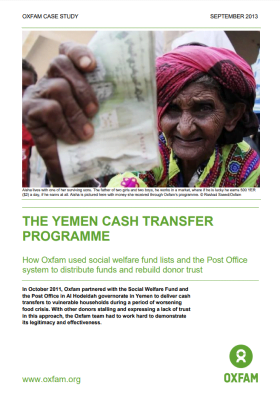
The Yemen Cash Transfer Programme
Report
This case study shows how Oxfam used social welfare fund lists and the Post Office system to distribute funds and rebuild donor trust. In October 2011, Oxfam partnered with the Social Welfare Fund and the Post Office in Al Hodeidah governorate in Yemen to deliver cash transfers to vulnerable households...